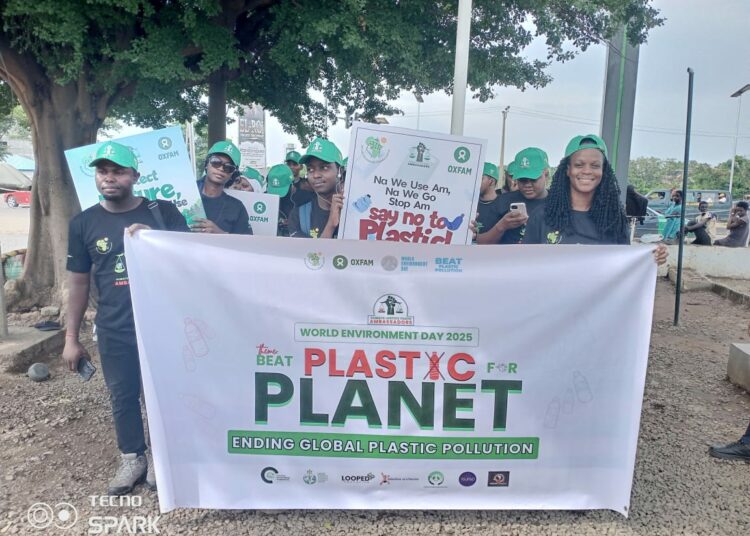Oxfam Nigeria has called on the federal government to ban single-use plastics and enforce policies that hold manufacturers accountable for the entire lifecycle of plastic products, as part of efforts to tackle the country’s growing environmental crisis.
Speaking during a World Environment Day event in Abuja, Climate Justice Manager at Oxfam, Dr Kenneth Akpan emphasised the urgent need for Nigeria to transition into a circular economy by promoting recycling, reuse, and support for small-scale waste management industries.
“The government must enforce existing policies and invest in education and recycling infrastructure. Many Nigerians are unaware of how or where to recycle, despite labels on plastic products,” Akpan stated.
He also urged producers to take full responsibility for their products beyond the point of sale and advocated for broader public education on waste segregation.
The event, hosted by the Federal Ministry of Environment in partnership with Rural Women Energy Security (RUWES) Nigeria, featured a quiz competition aimed at raising environmental awareness among students.
Community Secondary School, Asokoro, emerged winner, receiving the Minister’s Cup and a N500,000 prize. Other top-performing schools included Government Junior Secondary School Gwagwalada, School for the Gifted Gwagwalada, and Government Junior Secondary School Angwan Dodo.
Minister of Environment, Balarabe Abbas Lawal, who spoke on the theme “Ending Plastic Pollution”, described plastic waste as a multidimensional crisis affecting the environment, economy, and public health.
He linked blocked waterways caused by plastic waste to recurring floods across Nigeria.
“Plastic waste blocks drainage systems and waterways, forcing water into homes, farmlands, and public spaces,” he warned, stressing the need for collective action to protect the environment and reduce disaster risks.
The president of the ECOWAS Commission, Dr. Omar Alieu Touray—represented by Yao Bernard, Acting Director of Environment and Natural Resources—also addressed the gathering, highlighting West Africa’s growing plastic problem.
He revealed that the region generates nearly 8 million metric tonnes of plastic waste annually, a figure projected to rise by 52% within five years.
“Over 80% of this waste is mismanaged, with grave consequences for public health, ecosystems, and economies, especially fisheries and tourism,” Bernard noted.
He warned against heating plastics in microwaves due to their hydrocarbon content, which poses cancer risks, and praised ongoing efforts by countries like Nigeria, Senegal, Ghana, and Côte d’Ivoire to promote circular economies and implement extended producer responsibility.
Bernard highlighted ECOWAS’ 2023 regional regulation on plastic standards and called for sustained collaboration to curb plastic pollution, while supporting green industrialisation and stronger environmental protections across the region.










